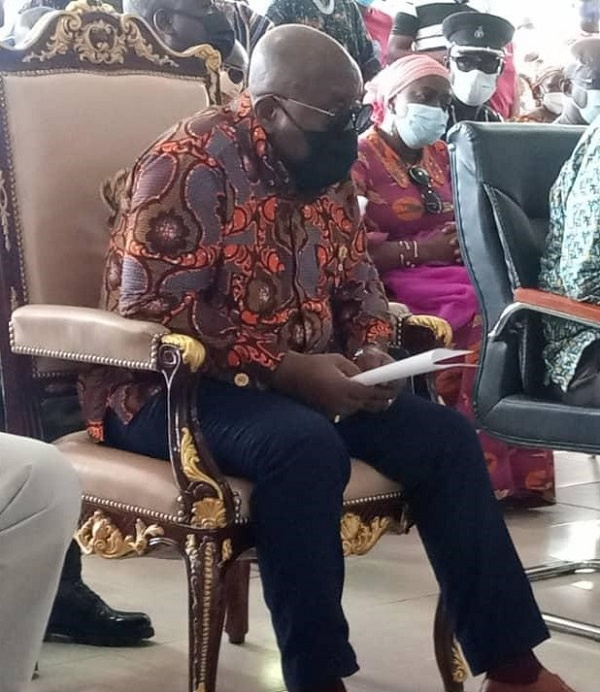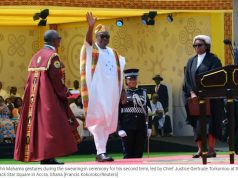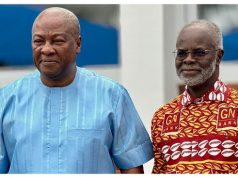Towards the end of 2017, the President of Ghana, Nana Addo Dankwa Akuffo Addo granted Aflao, in the Ketu South Constituency, a Municipal Status.
According to analysts, including this writer, the move by Nana Addo (who is known in the political arena, as a master strategist and tactician) is the beginning of elevating Aflao into Ghana’s all-inclusive tourist attraction, just like Las Vegas in the United States.
Aflao borders, the Togolese capital of Lomé, and like Lomé, has a lush seafront with white sand, natural beauty, and vibrant local economy and through traffic from neighbouring countries to Ghana.
After Kotoka International Airport, Aflao is the second gateway to Ghana.
The Togolese capital, the so-called ‘Paris of West Africa’ would have Aflao to contend with in terms of amenities and tourism when Aflao is elevated into a city-state.
In his state of the nation address in 2018, Nana Akuffo Addo stated that the exploration work being undertaken by Ghana National Petroleum Company (GNPC, which was elevated into a transnational company by Lawyer Tsatsu Tsikata, a distinguished son of Aflao) through its survey, has established the presence of huge reserves of oil and gas onshore Voltaian and the Keta Basins.
of the country, Aflao, which sits at the very end of the country and borders the Togolese Capital of Lomé, would be the beneficiaries of Ghana’s oil find at the Keta and Voltaian Basins.
In 2018, the Petroleum Commission of Ghana gave TG-Geopartners the green light to acquire a major multi-client 3D geophysical survey in the “relatively underexplored but highly prospective” according to Thomas Tsiboe-Darko, whilst the primary play will undoubtedly be the late Cretaceous turbiditic channels found in Jubilee, we are also excited about the possibility of extensive late Cretaceous and Tertiary basin floor fans containing very large volumes of hydrocarbons, which could exceed the existing discoveries offshore Ghana.
The Multi-client 3D seismic will help unlock the next wave of major oil discoveries of the Keta and Voltaian Basins. The Keta and Voltaian Basins reserves are estimated to hold 3 times the entire oil discovery of the Western Basin and largest gas reserves, ever.
Indeed, when oil is lifted from the first well that would be drilled in the Voltaian/Keta Basins, Afloa would instantaneously overtake the twin city of Sekondi-Takoradi, as the Oil city of Ghana.
Currently, some of the shrewdest investors in Ghana have started to buy land and other assets, from Ada, Big Ada, Adafoah, Sogakope, Kilkor, Adidome, Akatsi, Anloga to Aflao through the eastern coastal towns of Ghana, in anticipation of the announcement of the major oil and gas discoveries in the Keta and Voltaian Basins.
Aflao, which is earmarked to be the operational headquarters of all the major oil companies to operate in the Voltaian and Keta Basins, lands are being sold for above the market prices of land in Lomé, the Togolese capital.
Like the Nigel Delta in Nigeria, the Keta and Voltaian Basins would propel Ghana into the 3rd Largest oil producer in Africa, after Libya and Nigeria, and overtaking Angola. Some estimates that the Keta and Voltaian oil discoveries would be far bigger than the Nigerian reserves or close to the same volume.
The Voltaian Basin stretches from Yendi in the Northern part of the country to Segakope in the South
With the above potential in mind, the Ghanaian President, Nana Addo Dankwa Akuffo Addo has elevated the status of Aflao in the Ketu South Constituency to Municipality, to rival Ho, the Capital of Volta Region.
Already, the Road and Highways Minister in Ghana, Kwesi Amoako-Atta, a cousin of the President, has said in the Ghanaian Parliament, that all major roads connecting the regions would be dualized, including the major Accra to Aflao Highway.
Turning Aflao into a major tourist destination would be a game-changer for Ghana in terms of regional geo-politics. Lomé, the Togolese capital, which sits next door to Aflao, would be in direct competition, however many development economists, including this writer, argues that Aflao would have the edge for the following reasons:
1) Aflao is a border town and Ghana’s second gateway, after Kotoka International Airport.
2) Aflao is the most populous and fairly developed town in the Keta Basin. Aflao was initially earmarked to be the capital of the Volta Region by the Nkrumah CPP administration but was switched to Ho due to Ho’s strategic location. Moreover, the citizens of Aflao are bilingual, English and French.
3) According to Kwesi Amoako-Atta, the Road and Highways Minister, the Tema-Afloa Road is an important international road in the southeast of Ghana, forming part of the trans-west African highway, which includes Lomé, Cotonou, Lagos, and Port Harcourt.
Togbui Amenya Fiti V, the Paramount Chief of Aflao Traditional Council and a very influential chief in Ghana, in a meeting with the President in 2017 at Flagstaff House (The Seat of the Ghanaian Government), recounted the 2005 political crisis that hit Togo, which resulted in over 100,000 Togolese refugees crossing into Ghana through Aflao alone.
Although Togbui Fiti V wasn’t explicit, those at the meeting stated that he wants the government to tightened security and border enforcement along the Ghana-Togolese border to protect investments, and prevent terrorism, from closing the borders of the Francophone countries into Ghana, etc.
With the current rate of population growth of Aflao, mainly because of its importance as an important border and market town, once the major oil and gas discoveries of the Keta and Voltaian Basins is announced, most analysts, including this writer, envisage that Aflao would instantaneously be elevated into a major city-state to rival Accra, Kumasi, and Tamale and would overtake the twin city of Sekondi-Takoradi to become Ghana’s 4th City.
Since he won the Presidency in 2016 and again in 2020, the President of Ghana, Nana Akuffo Addo has made over 5 trips to Aflao, most importantly to re-emphasize the importance of Aflao as the foremost border town in Ghana and a potential major tourist destination.
Most might misconstrue the President’s visits as political, however the real motive of Nana Addo’s visits to Aflao, is about his Legacy, to put Aflao firmly on the map as Ghana’s major tourist destination, and an important oil and gas city, once the oil and gas find is announced.
On his last visit to the Volta Region, the President of Ghana, Nana Akuffo Addo made it clear to the journalists, both local and foreign that not a single blade of land in Aflao that belongs to Ghana would be yielded to any foreign country.
Nana Addo said, “We shall defend every inch of our homeland, including every inch of land in Aflao.”
Aflao, after the announcement of the largest oil and gas, finds in the Keta and Voltaian Basins, would rival Tamale as another fastest-growing city in West Africa. Currently, it is the 28th most populous settlement in Ghana, in terms of population.
It once served as one of the major markets of the slave trade. With its close proximity to Accra, the Ghanaian capital, it takes 2 hours 26 minutes to travel the 98.4km from Accra, the Ghanaian capital, however, with the completion of the intended dualization of the highway, journey time would be reduced to 2 hours.
Currently, the Ghanaian government is employing a deliberate strategy of finishing with the Western Basin allocations before commencing those in the Voltaian Basin for a cogent reason.
This is that the area already has requisite infrastructure including two pipelines to the shore and three FPSOs. These assets could facilitate the fast-tracking of producing fields out of any further discoveries.








